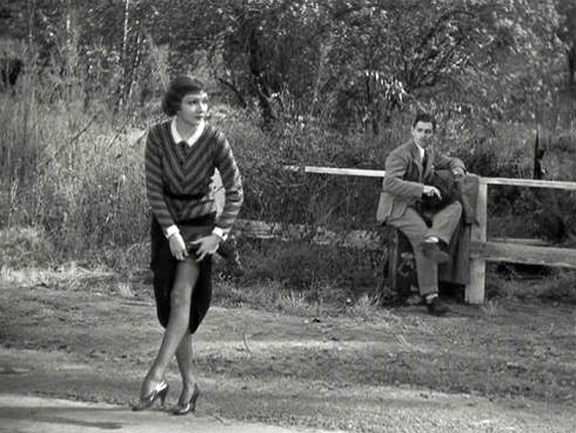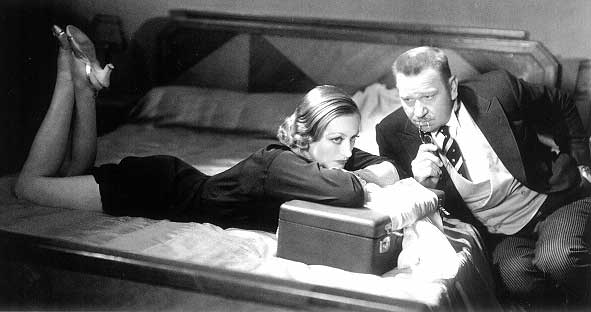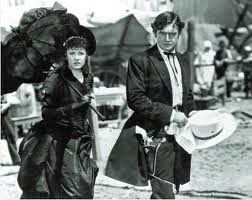Nominated: Adventures of Robin Hood, Alexander's Ragtime Band, Boys Town, The Citadel, Four Daughters, Grand Illusion, Jezebel, Pygmalian, Test Pilot
Should Have Won: Adventures of Robin Hood
"The last time America used battleships was the Spanish-American war, and what did we get for that? Cuba. And we gave that back."--Martin Vanderhof
With
a combination of director Frank Kapra and star Jimmy Stewart, it
would seem You Can't Take it With You could declare its classic
movie status by default. Capra has such gems under his belt as It
Happened One Night and Mr. Deeds Goes to Town, and has
teamed up with Stewart for It's A Wonderful
Life, Mr. Smith Goes to Washington and this 1938 Academy Award
winner You Can't Take it With You. The movie has many interesting
characters and some oddball situations and it seems like it should
go down as one of the greatest ever made; one that would be on everyone's
“must see” list. For me it was just okay.
Stuck-up
banker Anthony Kirby wants to buy a 12-block area of land but one
house on the block refuses to sell. This house belongs to Martin
Vanderhof and it happens that Kirby's son Tony (the always reliable Jimmy Stewart) begins dating his father's secretary, Alice,who is one of the Vanderhof clan (though her last
name is Sycamore). This leads to one of those age old stories of
mixed dating, one poor one rich. The Kirbys disapprove, of course;
particularly after a dinner meeting. Tony deliberately told the the
families the wrong date of when the dinner would take place so that
his parents could surprise the family to see how the Sycamores (or
Vanderhofs, whatever) would really behave, so his parents know they
are getting the real article. Living with the Vanderhofs is Kolenkohv, a former
Russian wrestler who is a good character but I don't really remember
what he had to do with the family. And also there is a man who isn't
a member of the family and when the movie started, I thought would be
a major player. His name is Poppins and he invents odd gadgets and
creeps around with Halloween masks scaring the visitors.
Two
unexpected guests visit the Vanderhof/Sycamore/Whatever, family. One
is an IRS collector who tells Martin he has never paid his taxes and
Martin has an answer I wish was as easy to throw out at an IRS man in
real life. He never paid because he doesn't believe in it. When the
IRS man explains taxes help pay for battleships in the war, my
favorite line in the movie popped up.
The
main scene in the movie is the dinner in which the upscale Kirbys are
served Frankfurters, corn, sour kraut,and canned salmon. The whole
house is bonkers with the looney Martin and his stories, Poppins and
his masks, Kolenkohv who proceeds to perform wrestling holds on
Kirby, and Penny who is a delightful character, spending most of her
scenes dancing around the house as Ed (another family member I think)
plays the xylophone. The police raid the house during the party but
I'm still not sure what it was about. They charged Ed with putting
fake...somethings...in boxes of...somethings. But then the whole
party (Vanderhofs and Kirbys alike) get arrested because of the
illegal fireworks in the basement. I guess the police had a right to
search a house in those days for things other than their original
purpose which, as I said, was the fake whatever-they-weres in the
boxes of whatever-it-was. By the way, I will note here that I'm
willing to bet the film does answer what that was about. I watched that entire sequence twice trying to pick up on it but didn't. I'm not too
proud to admit it might have gone right by me. Maybe you can fill me in.
The
movie wraps up very well and saves itself, for me. That is for me,
you might have liked the whole thing. It seems most do. I didn't
really care for it but there is a piece of dialogue while they are
all in the holding cell that moved me and after the courtroom scene, the end
offers us a fantastic sequence where Kirby and Vanderhof play a
harmonica duet while Penny dances around in the background. It is by
far the best scene and it is just before the final wrap-up scene
around the dinner table.
I'll
go ahead and recommend you check it out because of its reputation.
Clearly I went in with the wrong attitude or something because I
didn't care for it at all. But with its director, stars, and status
who knows? It could be one of your favorites too.










_poster.jpg)
